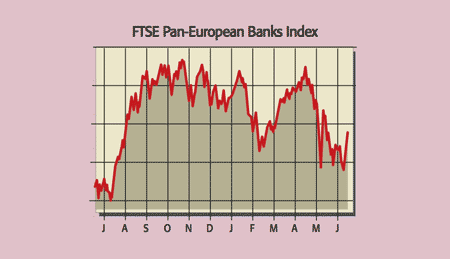
“A palpable and growing sense of fear” surrounds Europe’s banking system, says Gillian Tett in the Financial Times. Interbank lending rates have jumped sharply in recent weeks. Banks deposited e360bn, a record weekly total, at the European Central Bank (ECB) last week, rather than lend it to counterparties they fear could collapse.
The market in debt issued by banks has seized up, with bank bond sales slowing to their lowest level since American bank Lehman Brothers collapsed in 2008. Spain is a particular worry. For most Spanish companies and financials, “international capital markets are closed”, says BBVA chairman Francisco Gonzalez. The cost of insurance against defaults in the banking sector is near a record. The ECB is keeping the banks on life support by offering unlimited liquidity.
The trouble is the sector’s large exposure to the debt-ridden peripheral economies. The latest report from the Bank for International Settlements estimates that French and German banks alone are on the hook for almost $1trn (€800bn) of private and public debt issued by Spain, Ireland, Portugal and Greece. There are also loans to eastern European states, such as Hungary and Bulgaria, to worry about.
But nobody knows which banks are most exposed. It doesn’t help that they’ve raised less capital than US banks over the past two years. European banks have raised 66% of their funding requirements for 2010, reckons Morgan Stanley.
However, if interbank and bank bond markets remain frozen, they will have trouble raising the rest, which implies less lending, endangering the economic recovery, says James Mackintosh in the FT. A “full-blown banking crisis” is unlikely as long as the ECB provides unlimited liquidity. But this situation is unsustainable. “The more they have to rely on relatively short-term central bank funding, the more worried banks themselves are likely to become.”
The solution is to publish the results of the stress tests on the European banking sector that are currently being carried out. But German politics may prevent this, says Tett. Having just pushed through an unpopular package to rescue Greece, officials are loath to tell voters they’re conducting stress tests to cope with a Greek default. For now, the sickly European banking sector looks set to continue “haunting” global markets.